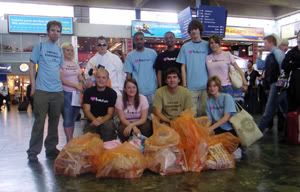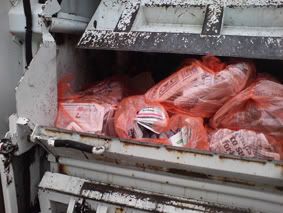Taken from News Corp's carbon report - "We aim to transform our business practices in order to significantly reduce our energy use and carbon emissions. Each News Corp. business unit is on the path to achieving carbon neutrality, net zero carbon emissions."
And Mr Murdoch continues within his own address to News Corp - "Now, I realize we can't take just one year in one city or even one continent as proof that something unusual is happening. And I am no scientist. But there are signs around the world, and I do know how to assess a risk. Climate change poses clear, catastrophic threats. We may not agree on the extent, but we certainly can't afford the risk of inaction. We must transform the way we use energy, and of course not only because of climate change..."
I followed Mr Murdochs advise and had a look at his Myspace.com/ourplanet site so that I could see how he was communicating with the internet generation. And what I found was that the address I inputted was forwarded onto the normal Myspace site resplendent with advertsising for Myspave TV - the tagline for this particuler advert was 'Scrap your TV and switch to MySpacetv.com'.
And as Mr Murdoch goes on to say "News Corporation, today, reaches people at home and at work... when they're thinking... when they're laughing... and when they are making choices that have enormous impact."
Exactly Mr Murdoch! Couldn't have put it better myself. And what a great example you are setting to us all.
Friday, October 5, 2007
Thursday, August 23, 2007
Small steps
Certainly it's good news that Westminster City Council have at last been able to announce the results of their protracted negotiations with the free newspaper publishers this week. As Westminster have been bearing the brunt of the freesheet war over the past 12 months it is only sensible that pilot projects are tested out in the borough which has to deal with 4 tonnes of newspaper every day. However a few questions spring to mind...
Are these measures alone going to solve the problem of diverting free newspapers from going to landfill?
What measures will be put in place to deal with the excessive number of free papers to be found on the buses, the tube network and the regional trains services?
How are we going to stop the culture of abandoning waste on the transport infrastructure which is so costly and bad for the environment?
On September 12th Project Freesheet is going to take to the streets once more to assess the impact of the new bins being sponsored by Associated Newspapers and News International. We will gather data which will give an accurate account of how much paper is ending up in the aforementioned recycling bins compared to what is ending up in the waste bins or on the street. If you would like to join us please email via the website for more details
As the gentle ripple of approval throughout the media continues let us see how many more boroughs and transport networks follow Westminster's lead in succeeding to get the free newspaper publishers to clean up their own mess.
Are these measures alone going to solve the problem of diverting free newspapers from going to landfill?
What measures will be put in place to deal with the excessive number of free papers to be found on the buses, the tube network and the regional trains services?
How are we going to stop the culture of abandoning waste on the transport infrastructure which is so costly and bad for the environment?
On September 12th Project Freesheet is going to take to the streets once more to assess the impact of the new bins being sponsored by Associated Newspapers and News International. We will gather data which will give an accurate account of how much paper is ending up in the aforementioned recycling bins compared to what is ending up in the waste bins or on the street. If you would like to join us please email via the website for more details
As the gentle ripple of approval throughout the media continues let us see how many more boroughs and transport networks follow Westminster's lead in succeeding to get the free newspaper publishers to clean up their own mess.
Thursday, August 2, 2007
Thin end of the wedge
A new free weekly magazine is soon to appear on the streets of London from French Connection founder Stephen Marks and film director Matthew Vaughn. Codenamed Alpha One, the title will be the first general-interest weekly given away free to men.
The magazine is the brainchild of former IPC editorial director Mike Soutar… Mr Soutar said half a million copies of the title would be distributed by hand on a Thursday at key commuter points across the country, including London, Glasgow, Birmingham, Manchester, Edinburgh and west Yorkshire.
Mr Soutar added: ”For consumers under the age of 45 the power of free media is extraordinary. Survey after survey shows younger consumers value free media as much as paid for and expect the same quality both online and in print. Alpha One, the title will be the first general-interest weekly given away free to men, who are shunning monthly magazines such as GQ and Esquire."
As the competition between 'paid-for' and free publications increases, I don't think anyone can be in denial about the increasing problem being faced by the local authorities due to the ever increasing amount of free literature now being handed out on our streets. 30% of the European newspaper market is now free - that's nearly 27 million publications being handed out on a daily basis.

I was at the London Recycling Officers Group (LROG) meeting held at City Hall, London, yesterday (chaired by Beverley Simonson, Waste minimisation and recycling officer for Ealing Council), where recycling officers from boroughs all over London gather to share knowledge and update each other on all aspects of recycling management. I gave a presentation which seemed to go down well, and was pleased that some offered to help out with the next round of volunteer recruitment for our upcoming walkabout (date + details soon to be announced).
One interesting discussion early on in the meeting was with Shameem Shah (from the DEFRA Waste Strategy Review Team) who was questioned about who was supposed to pay for the increasing amount of commercial waste that the authorities are having to look after, at the expense of the tax payer. Yet again we are seeing the private sector making savings at the tax payers expense. Legislation does not exist to negotiate this problem.
Lets hope the Government through our efforts can be influenced to look at producer responsibility as the primary way in which to take the burden off the tax payer. It simply isn't right that tax payers are subsidising the private sector in this manner.
The magazine is the brainchild of former IPC editorial director Mike Soutar… Mr Soutar said half a million copies of the title would be distributed by hand on a Thursday at key commuter points across the country, including London, Glasgow, Birmingham, Manchester, Edinburgh and west Yorkshire.
Mr Soutar added: ”For consumers under the age of 45 the power of free media is extraordinary. Survey after survey shows younger consumers value free media as much as paid for and expect the same quality both online and in print. Alpha One, the title will be the first general-interest weekly given away free to men, who are shunning monthly magazines such as GQ and Esquire."
As the competition between 'paid-for' and free publications increases, I don't think anyone can be in denial about the increasing problem being faced by the local authorities due to the ever increasing amount of free literature now being handed out on our streets. 30% of the European newspaper market is now free - that's nearly 27 million publications being handed out on a daily basis.

I was at the London Recycling Officers Group (LROG) meeting held at City Hall, London, yesterday (chaired by Beverley Simonson, Waste minimisation and recycling officer for Ealing Council), where recycling officers from boroughs all over London gather to share knowledge and update each other on all aspects of recycling management. I gave a presentation which seemed to go down well, and was pleased that some offered to help out with the next round of volunteer recruitment for our upcoming walkabout (date + details soon to be announced).
One interesting discussion early on in the meeting was with Shameem Shah (from the DEFRA Waste Strategy Review Team) who was questioned about who was supposed to pay for the increasing amount of commercial waste that the authorities are having to look after, at the expense of the tax payer. Yet again we are seeing the private sector making savings at the tax payers expense. Legislation does not exist to negotiate this problem.
Lets hope the Government through our efforts can be influenced to look at producer responsibility as the primary way in which to take the burden off the tax payer. It simply isn't right that tax payers are subsidising the private sector in this manner.
Monday, July 16, 2007
Waste escalation
As reports of new measures to combat excessive household waste going to landfill are debated in the UK, the free newspaper publishers of the World carry on merry in the knowledge that their industry has never had it so good.
Record breaking profits and circulation figures continue to be reported in the press. Metro International have reported more than the first profit ($13m) ever for the company. Metro UK are looking forward to increased revenue later this year when they increase their circulation within the ever competitive market of London by producing a further 200,000 copies of their morning edition free paper, Metro. And City AM publishers have announced that they will be looking to publish their title in Frankfurt, Hong Kong, Tokyo, New York, Paris and Amsterdam.
Free newspapers are now being 'given away' on the streets of 50 countries around the globe. And Israel may soon be the first country with more free than paid-for papers being distributed.

Now If anyone was under the impression that free papers are incidental publications that pose no threat to municipal services they should perhaps pay close attention to the outcome of the current 'Westminster versus Associated and News International' battle that is panning out behind closed doors in London. And how long will it be before the likes of Tokyo and New York have a similar problem to London's already excessive free paper distribution fiasco?
Right now, the free paper publishers are making huge savings off the fact that no-one has yet been able to force them to contribute to the clean up of their product. When this type of legislation is put into effect will the free newspaper business model continue to be so attractive to publishers?
Record breaking profits and circulation figures continue to be reported in the press. Metro International have reported more than the first profit ($13m) ever for the company. Metro UK are looking forward to increased revenue later this year when they increase their circulation within the ever competitive market of London by producing a further 200,000 copies of their morning edition free paper, Metro. And City AM publishers have announced that they will be looking to publish their title in Frankfurt, Hong Kong, Tokyo, New York, Paris and Amsterdam.
Free newspapers are now being 'given away' on the streets of 50 countries around the globe. And Israel may soon be the first country with more free than paid-for papers being distributed.

Now If anyone was under the impression that free papers are incidental publications that pose no threat to municipal services they should perhaps pay close attention to the outcome of the current 'Westminster versus Associated and News International' battle that is panning out behind closed doors in London. And how long will it be before the likes of Tokyo and New York have a similar problem to London's already excessive free paper distribution fiasco?
Right now, the free paper publishers are making huge savings off the fact that no-one has yet been able to force them to contribute to the clean up of their product. When this type of legislation is put into effect will the free newspaper business model continue to be so attractive to publishers?
Thursday, June 14, 2007
Walkabout - The Premier

Starting in Liverpool St @ 10am I had already collected 40 odd Metro's without too much effort. Then having agreed our plan 15 of us left to meet up later on, none of us really knowing what to expect. We were pleasantly surprised by people's reactions however. Pretty much everyone we spoke to was in agreement that the free papers are a serious litter problem for London. Despite claims by Metro, we were picking up plenty of their copies during the 10am - 1pm slot.
Admittedly the streets weren't overflowing with free papers during our first outing, but we were concentrating on conversation and engagement with the public during this quieter part of the day. The really interesting thing for me was the consistency of people's reactions - everyone was of the same mindset - ie 'having found this paper on the tube I might read it, but it isn't mine so i don't feel that obliged to recycle it'. Therein lies the real problem; once abandoned on the tube the papers can really only be classed as public litter.
On to Euston where everyone reconvened looking uplifted by their morning of engagement, but all were suffering from filthy hands and slightly aching backs. Having secured our mornings stash with a friendly operative at Euston (to be picked up later) we all left for our next session. And from there it really took off.
No-one was able to collect all the papers that had been abandoned. The large recycling bags we were using just weren't big or strong enough. I'm not trying to exaggerate; if we'd had a 100 volunteers and we'd concentrated on the busiest time for freesheets (4-8pm) I think we could easily have collected in excess of 15,000. The only limiting factors for us were the bags, our strength, and the number of bags we could carry with us. The abandoned papers were in plentiful supply.
As it was we all made it to Trafalgar Square by 6.30 and collated the 19 bags we had dragged around town. We worked out we had approximately 80 papers in each - grand total 1500. Photo's of our stash and interviews followed and then it was off to the pub via the recycling truck that had very kindly been supplied by Westminster Council.

Come September when we undertake 'Walkabout 2' with our ever growing army of faithful volunteers I'm looking to achieve the gathering of 15,000 collected papers. And if you don't believe me, you can come and count them yourself.
;-)
Friday, June 8, 2007
Metro meeting
A big thankyou to Kenny Campbell (editor), Don Gray (distribution) and Karen Wall (marketing) from Metro.
After a request sent from Project Freesheet we were invited to sit round the table to discuss the issues raised by Project Freesheet.
Of course we disagreed on a few points but the fact remains that Metro have invited us in, explained to us their point of view, told us about what they are trying to do to deal with the lack of recycling and enabled us to carry on with our campaign further enriched in the hope that positive actions will result.
If only the other free paper publishers were half as responsible. This issue, for me, keeps coming back to producer responsibility. And Metro appear to be doing their bit; though is it enough?
But what of the other free newspaper producers? Are they doing their bit?
After a request sent from Project Freesheet we were invited to sit round the table to discuss the issues raised by Project Freesheet.
Of course we disagreed on a few points but the fact remains that Metro have invited us in, explained to us their point of view, told us about what they are trying to do to deal with the lack of recycling and enabled us to carry on with our campaign further enriched in the hope that positive actions will result.
If only the other free paper publishers were half as responsible. This issue, for me, keeps coming back to producer responsibility. And Metro appear to be doing their bit; though is it enough?
But what of the other free newspaper producers? Are they doing their bit?
Tuesday, April 3, 2007
Farming in Wales

I was over in Wales last week, visiting my auntie on her farm in Carmarthenshire. Denny and her husband Martin moved down to Wales from London 20 years ago to farm sheep and cattle.
For the last few years they've been turning their land to tree planting on behalf of the Woodland Trust. They've planted 18,000 trees over 20 acres. And every 2 years they'll have to cull about half of what they've planted to make room for the stronger trees. Then in 20/30 years they'll have some beautiful mature trees which will add hugely to the local environment providing a rich resource for bio-diversity to thrive unchecked. All very lovely.
The Woodland Trust have advised Denny and Martin that they'll probably end up with 1000 or so trees from the 18,000 planted. Herein lies an interesting point; how can we attempt to quantify the impact that the loss of 9000 trees (the number of trees used every day around the world by the freesheet publishers) has on the environment when you consider that 18 times that number of trees would have to have been planted in the first place if the forest was being managed properly?
Subscribe to:
Posts (Atom)

